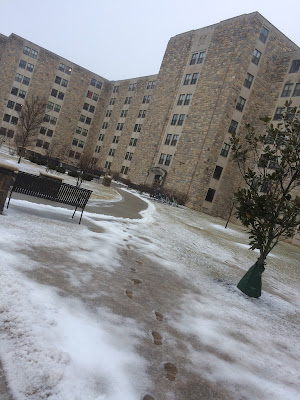Beginning
late in the night on Saturday February 3rd and continuing into the
early morning of Sunday, snow and freezing rain infiltrated Blacksburg,
Virginia, blanketing the Virginia Tech campus.
As the temperature warmed, the freezing rain returned to its more common
liquid state; however, that did not help to eliminate the slushy, slippery
conditions. In fact, the additional rain
induced minor flooding, as the saturated ground had already reached its water carrying
capacity. This picture, taken outside of
West Ambler Johnston residence hall on February 4th, portrays the
aforementioned snowy conditions. For this
particular weather phenomenon to occur, certain atmospheric conditions must be
present. While the process can be intricate
and complicated, the following circumstances are the fundamental foundations of snow
formation. First, the temperature in the
clouds must be at or below the freezing point, and the temperature near the
ground must be relatively close to freezing as well. Additionally, there must be moisture in the
air that will freeze at these cold temperatures, taking the shape of ice
crystals. After these ice crystals begin
to merge and become heavier, they fall to the earth in the form of snow. As we have discussed in class, the
controversy surrounding global warming has provided scientists with an
opportunity to predict the many effects of increased global temperatures. Most experts believe that the impact of
global warming on snow will be sporadic, depending on the specific region in
question. This topic interests me
because I am originally from Southwest Virginia, and I am familiar with the
weather patterns in this area. It is
fascinating to consider the implications that global warming may have on the
winter weather in this area, but it seems that there is not enough factual evidence
yet to provide a definitive answer to that question.
Sources:
Andrew, Elise. “Does Global
Warming Mean More Or Less Snow?” IFLScience, IFLScience, 15 Aug. 2016,
www.iflscience.com/environment/does-global-warming-mean-more-or-less-snow/.

No comments:
Post a Comment